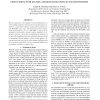Free Online Productivity Tools
i2Speak
i2Symbol
i2OCR
iTex2Img
iWeb2Print
iWeb2Shot
i2Type
iPdf2Split
iPdf2Merge
i2Bopomofo
i2Arabic
i2Style
i2Image
i2PDF
iLatex2Rtf
Sci2ools
ICIP
2005
IEEE
2005
IEEE
Video coding with MC-EZBC and redundant-wavelet multihypothesis
Motion compensation with redundant-wavelet multihypothesis, in which multiple predictions that are diverse in transform phase contribute to a single motion estimate, is deployed into the fully scalable MC-EZBC video coder. The bidirectional motion-compensated temporal-filtering process of MC-EZBC is adapted to the redundant-wavelet domain, wherein transform redundancy is exploited to generate a phase-diverse multihypothesis prediction of the true temporal filtering. Noise not captured by the motion model is substantially reduced, leading to greater coding efficiency. In experimental results, the proposed system exhibits substantial gains in rate-distortion performance over the original MC-EZBC coder for sequences with fast or complex motion.
| Added | 23 Oct 2009 |
| Updated | 14 Nov 2009 |
| Type | Conference |
| Year | 2005 |
| Where | ICIP |
| Authors | Joseph B. Boettcher, James E. Fowler |
Comments (0)

